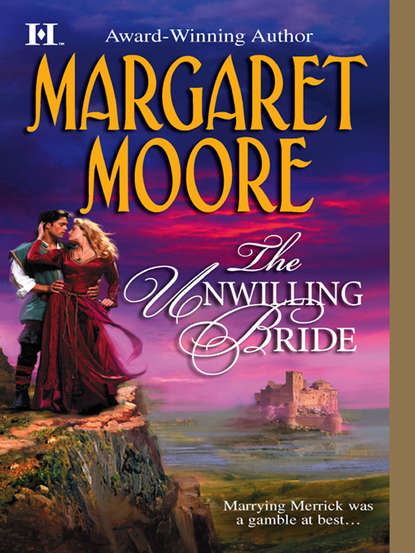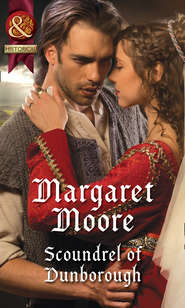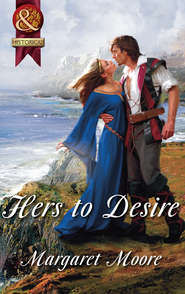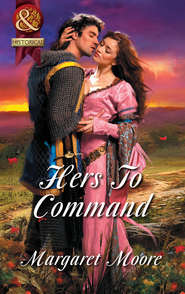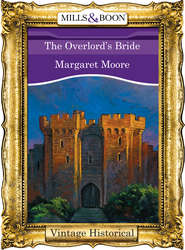По всем вопросам обращайтесь на: info@litportal.ru
(©) 2003-2024.
✖
The Unwilling Bride
Автор
Год написания книги
2018
Настройки чтения
Размер шрифта
Высота строк
Поля
“It’s been fifteen years,” Peder said, as if he suspected this was some kind of trick.
“I kept in practice by saying my prayers in Cornish,” Merrick explained. “But that’s not what I wish to discuss with you, Peder. I gather Lady Constance relies on you for information about the villagers.”
Constance stared at him with offended dismay. How had he come to that outrageous conclusion? She had never said that, nor would she ever betray the villagers’ trust.
“Lady Constance and me are friends, from when she was a girl,” Peder replied with scorn. “And neither of us are the sort to carry tales.”
“I meant no insult,” Merrick replied, glancing at Constance before again addressing Peder.
She wondered if he realized that he’d affronted her, too. Or cared if he had.
“I’d appreciate any guidance as to how I can best govern my people,” he said, “from a man who’s lived here all his life and has the respect of everyone.”
Was this a genuine request, or did he seek to flatter Peder into cooperation? Yet there was a tension in Merrick’s shoulders, as if he cared what Peder would do, or say, that seemed to belie that motive.
Peder regarded the nobleman steadily, without a hint of fear or favor, and Constance detected a note of pride in his voice when he answered. “It’s hard to tell what folks really think when you’re a great lord, I suppose. Too many tells ’em only what they want to hear.”
“A man in power needs trustworthy advisers,” Merrick agreed, his body still tense.
Would he heed a wife’s advice? Or would he pay attention to his betrothed’s views only until they were wed?
“You’d have me advise you, eh?” Peder asked, making no secret of his skepticism.
Merrick frowned, but she thought she saw disappointment lurking in his eyes, not anger. “I remember you from when I was a boy,” he said. “You were considered a good man. I could use the help of a good man.”
Constance hoped he never found out Peder had been smuggling out a significant portion of his tin for years.
“Please God, I’ll always be a good man, as much as one can be in these troubled times,” Peder said. His expression darkened. “But I’ll not spy on my friends.”
Merrick looked genuinely surprised. “Have I asked you to do so?”
What did he want, then?
“As I said, I remember you from before I left Tregellas,” Merrick continued. “I seek your help, if you’ll give it. Whether or not you do, I want to help you.” He went down on one knee so that he was looking directly into Peder’s face, his gaze searching for…what? Understanding? Agreement? “My father sinned greatly against your daughter, Peder, and caused your family much harm. I’m truly sorry for your loss. Although nothing can replace your daughter and her son, if there’s anything you ever need to make your days comfortable, you are to tell Constance or me, and I will see that you get it.”
Forgiveness? Was that what he was looking for in Peder’s aged face?
He didn’t get it.
Peder glared at him, anger furrowing his brow. “That can’t make up for what your father done.”
Disappointment flashed across Merrick’s face before he rose. “My offer stands, regardless,” he said before a loud, joyous cry coming from from the green made all three look that way.
“Unless I’m mistaken, my lady,” Merrick said, turning toward her, “they’re about to start the dance around the Maypole. I recall you were going to participate.”
“Can she still visit with me?” Peder demanded.
Merrick inclined his head. “Of course. I see no reason to forbid it. I’m grateful Lady Constance had such a friend while my father was alive.”
Peder got to his feet. “Then I’ll take her to the dancing, my lord.”
Merrick inclined his head. “Very well. I should discuss the boundary for the playing field with Sir Ranulf.”
Peder winked at Constance, although the look he gave Merrick when he addressed the lord of Tregellas was one of respect due to a nobleman. “Then good day to you, my lord.”
“Good day to you, Peder,” Merrick replied before heading toward the tavern where Sir Ranulf and Sir Henry were deep in discussion, and their ale.
“Look at ’im, the devil’s own spawn,” Peder muttered as he watched Merrick stride away. “Arrogant bastard. Handsome, like his father, and probably as sinful as his sire, too.” He slid Constance a sudden, piercing glance. “Maybe I shouldn’t be so free with my opinions.”
Constance couldn’t blame Peder for his hatred of the son of Wicked William, or the vices he believed Merrick would possess. She had been suspicious of him, too. How could she not be, remembering his father and all that he had done? Yet Merrick hadn’t acted the lascivious scoundrel since his arrival. The only woman he’d attempted to be intimate with, as far as she knew—and she would have heard—was herself. “Lord Merrick has given me his word that women will be safe from him.”
Peder scowled. “You think that means anything?”
Constance thought of Merrick’s tone and the look in his eyes when he vowed to respect her and to protect the women of Tregellas. “Yes, I do. At least, I hope so, and so far, he’s done nothing to make me believe otherwise. Maybe it’s because he was sent away from here so young. Perhaps Sir Leonard taught him to be a better man than his father ever could.”
“The boy decrees the man, my lady, and I’m old enough to know,” Peder declared as they walked toward the Maypole. “If that’s the Merrick who left Tregellas fifteen years ago, that’s a man you shouldn’t marry, or he’ll make you miserable, as his father did his poor mother. She was a gentle soul, and she thought she could change her husband. She found out quick enough she couldn’t, and many of us thought it a mercy she died giving birth to the boy.” Peder paused, and when he began again, his voice was thick with emotion. “You know what his father did to my daughter, my lady, and what became of her. Despair and disgrace and then…”
“Yes, Peder, I remember,” she said softly, squeezing his arm. “I will be wary. I promise. And there is something else I must tell you, while I have this chance. Merrick is determined to uphold the king’s laws against smuggling. You should cease for the time being, and pay taxes accordingly.”
“What, give all that money to the Norman king?”
“Lord Merrick may not prove to be as cruel and vindictive as his father, but until we know for certain, I think it would be best to be cautious. I appreciate that means less money for you, but that’s better than death, isn’t it?”
“That tax isn’t fair.”
“That’s why Alan de Vern and I were willing to turn a blind eye. Perhaps in time, Lord Merrick will come to appreciate that, but until then, I fear for your safety if you continue. Please, Peder, for my sake. You are like a grandfather to me and if anything happened to you…”
Peder looked at her with love in his steadfast brown eyes. “And you’re as dear to me as any granddaughter could be.” His gaze turned intense and he lowered his voice so she had to strain to hear him. “I think you should run, my lady. Run as far and as fast as you can from that Merrick.”
“I have thought of that, Peder,” she answered just as quietly. “But what would I do? Where would I go? How would I live?”
“I’m not the only one in the village who loves you like family, my lady. We know how many times you calmed the old lord when he was in one of his rages, and spared many a man’s life and a woman’s honor when you did. If you want to run away, come to me. We’ll help you get away and keep you safe.”
Although she was grateful for this offer, Constance felt no real relief or joy. If she got away, she would have to travel far before she could feel safe. She would be alone, in a strange land, among foreigners. She would be poor, for she wouldn’t take much from the villagers, who had little enough as it was.
Right now, that fate seemed far more lonely and frightening than…staying here.
Yet when she saw how anxious Peder was, she gave him a thankful smile. “I promise you, Peder, that if I decide to flee, I’ll come straight to you.”
“HURRY, CONSTANCE, HURRY, or the game’s going to be over!” Beatrice chided with bubbling enthusiasm as she led her cousin toward the river meadow a short while later.
“I think there’s plenty of time left,” Constance said, reluctantly following. She had no desire to lend her support to something she feared would end in disaster.
As they approached the mill, she was sure it had, for it sounded like a riot was already under way. Gathering up her skirts, she started to run.
“Wait! Wait for me!” Beatrice cried, hurrying after her.
“Go back to the castle,” Constance ordered over her shoulder. The last thing she wanted was for Beatrice to be involved in—





